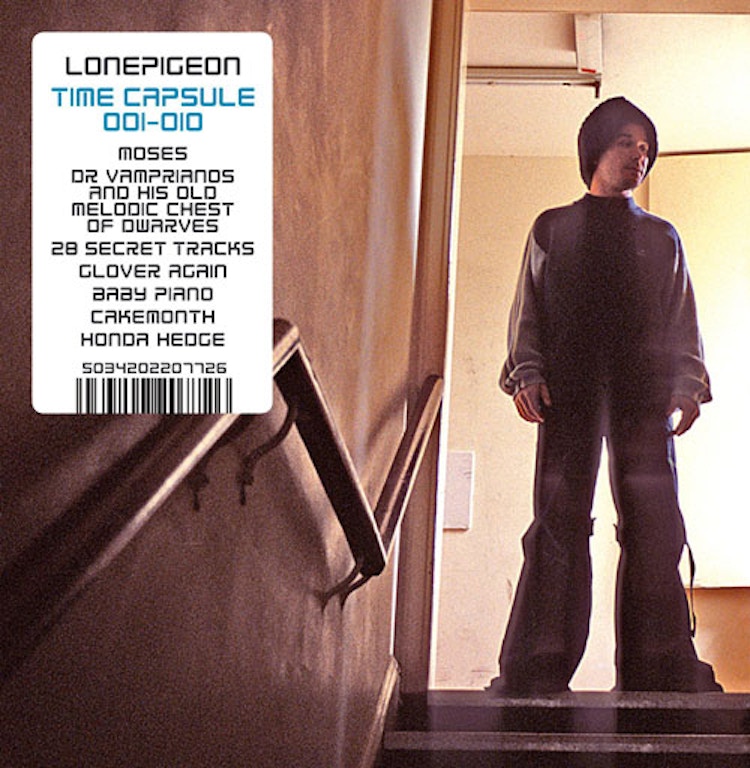Lone Pigeon – Time Capsule
""

As I delve into singer Gordon Anderson’s box-set (co-founder of The Beta Band and current singer of The Aliens), I sort of feel like I have invaded some sort of personal development session of his. Like that I have sat and listened to the intimate project of somebody who is more bothered about reflecting a confused mind through music, over and above impressing an outsider who listens in. His music, though multi-layered in parts and distinctively arranged throughout, appears to only emphasise a hidden loneliness that emerges as time goes on. And the more he reveals, the more I feel like I’m getting lost in the sound of somebody trying to find their voice.
In disc one, Moses, we are treated to a gentle exploration into instrumental music, largely based around acoustic guitars. This is, of course, with the exception of one or two tracks that explode with an almost awkward amount of energy. Take ‘Don’t Sell My Love’, for example, this sounds as out-of-place as a synthetic-sounding ringtone going off in a super quiet lecture theatre. At first, surprising because you can’t trace the source of the noise, and then next, slightly awkward because even when located, is still so out-of-place. Short, sharp interjections of cheerful audio are a recurring theme throughout Lone Pigeon’s Time Capsule. These, and abrupt endings…
Dr Vamprianos has the beauty of a Daniel Johnston recording: raw and honest, to the point of Anderson beginning to sound vulnerable. By track seven we are transported to a campfire sing-song, or perhaps even to a group of friends from the sixties, shaking tambourines and long hair around a vintage kitchen table (I heard a teapot whistle, okay?). ‘Simple Simon’ with its incessant accordion action is a little circus-like while final track ‘Xfam Radio’ transports you to an Australian back garden full of excited crickets and frogs, watching the television through the window of someone else’s house. An audio adventure for one (except short interjections that scare as well as excite mean you can’t control where you go).
From loud two part harmonies to the sound of some of the Beatles’ more psychedelic recordings, Twenty Eight Secret Tracks continues in its quest to leave you questioning the focus of Anderson’s art, and what it would all sound like if he just carried on singing after each song’s end. It leaves you wanting more, every time, searching for the second half of a song that never arrives. Like the feeling you get when you turn over a cassette tape to find there’s nothing recorded on the other side. Where did it go?
Perhaps we get the first real glimpse of this on CD four, Glover Again. This records stands out for having one track split in half, and separated by six other songs, ‘Glover’ and ‘Glover Smile’. With the sound of an all-together more cheerful sounding outfit in ‘Glover’, Lone Pigeon begins singing about a friend struggling to get over an ex-girlfriend through a host guitar strums, a distorted kazoo and some imaginary trumpets (naturally), but as the disc rolls on, it would appear that the second part of this story develops through ‘Mr Glover’.
Baby Piano, equally as sombre, leaves you sat picturing a broken man at the edge of his piano. This album sparkles because you feel as though you’ve gotten a bit closer to the thoughts, ideas and feelings that consume Lone Pigeon the most. But then, as though in a bid to stop you presuming you know the ins and outs of his mind too well, that you think he always sounds this hurt, or that he consciously decided to expose a more vulnerable side to himself, the Lone Pigeon of CD six appears to return to an earlier form of music making. Sure, it all ends on a sweet, dreamlike note but earlier tracks echo the childish ramblings of Moses, and CD seven, Honda Hedge employs the same distracting titles, sprightly starts and odd sound effects that inhabit all of the first three releases. He ends as he began. Almost…
Anderson returns to making records using the sounds of everything, but having listened to the rest of the box-set in chronological order, the fact that Honda Hedge ends on a much more subdued note, is very telling. Time Capsule is a hike through Lone Pigeon’s fifteen year history of music making, but it’s also the personal journey of singer-songwriter Gordon Anderson, and judging by the fact that elements of the more fragile-sounding albums of four and five are apparent in the last, suggest that this journey is one that still hasn’t reached its end.
Get the Best Fit take on the week in music direct to your inbox every Friday

Wet Leg
moisturizer

MF Tomlinson
Die To Wake Up From A Dream

BIG SPECIAL
National Average





